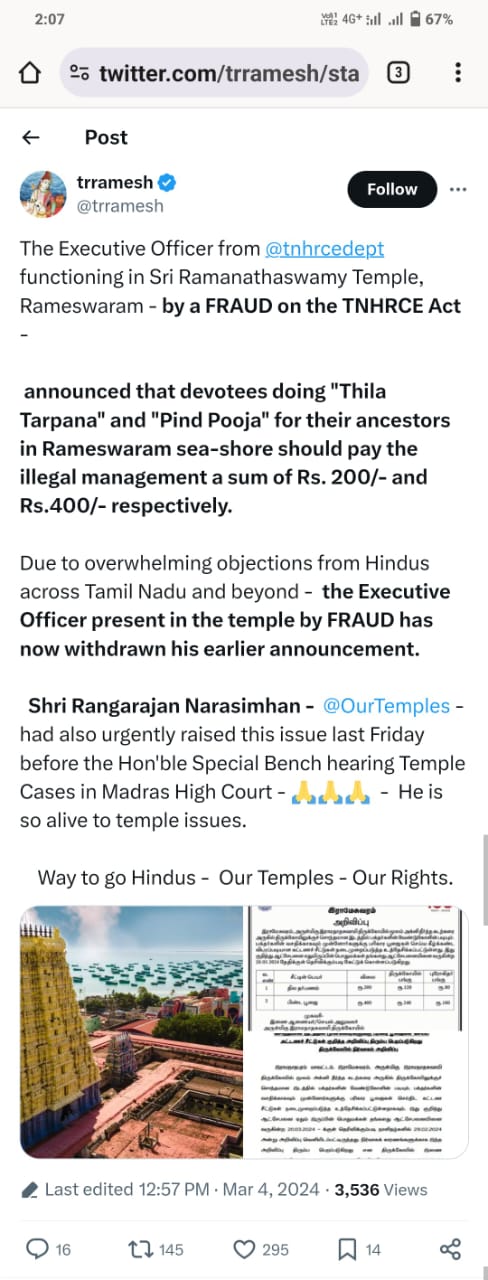Following widespread protests from Hindu groups, devotees, and pundits, the Tamil Nadu government has withdrawn its decision to impose fees on pilgrims performing pinta pithru tharpan in Rameswaram. The government cited “administrative reasons” for the reversal, signalling a retreat from its earlier stance.
Rameswaram, home to the revered Ramanatha Swamy Temple, attracts pilgrims from across the country, making it a crucial destination for spiritual seekers. Situated on an island and steeped in the lore of the Ramayana, Rameswaram holds immense significance in Hindu tradition. The pilgrimage to Rameswaram, often undertaken alongside the journey to Kashi, is considered essential for Hindu devotees.
The Kashi-Rameshwaram Yatra holds profound importance as pilgrims perform Vedic rituals to honour their forefathers and seek blessings for their families and future generations. Upon arrival in Rameswaram, pilgrims partake in sacred rituals, including the Agni Theertham and Srardham ceremonies. They collect sand from the seashore, symbolising their pilgrimage, and perform various rituals under the guidance of vedic pundits or purohits.
However, the Tamil Nadu Government’s decision to impose fees on pilgrims performing pinta pithru tharpan sparked outrage among Hindu groups and devotees. Critics viewed the move as an attack on religious traditions and an attempt to target an integral aspect of Hindu rituals. The government’s advertisement inviting public opinion on the proposed fee structure drew widespread condemnation.
The proposed fee structure outlined charges for different rituals, with a portion allocated to the temple and the rest to the purohits or pandas assisting with the ceremonies. For instance, the fee for Thil tharpan was set at Rs. 200, with Rs. 120 designated for the temple and Rs. 80 for the purohits. Similarly, the fee for Pinta pooja was Rs. 400, with Rs. 240 allocated to the temple and Rs. 140 to the purohits.

The announcement of the proposed charges led to widespread outrage, with devotees and Hindu Munnani vehemently opposing what they perceived as an attempt to commercialise sacred rituals. The government’s decision to seek public opinion on the matter fueled further discontent.
The advertisement set a deadline of March 20 for receiving opinions, both in favour of and against the proposed charges. However, the public backlash and the intensity of the protests prompted the Tamil Nadu government to swiftly reverse its decision. The move to withdraw the fees comes amid growing concerns about the impact of such decisions on the sentiments of devotees and the sanctity of religious practices.
blob:https://web.whatsapp.com/ba3d87df-2129-4f1a-9697-e5136361d154
Even before the deadline for submitting opinions, the Hindu Religious and Charitable Endowments (HR and CE) department announced the withdrawal of the proposal. In a note, Temple Executive Officer and Joint Commissioner S. Sivaramakumar stated that, considering public convenience and opposition, the proposed fees for pinda pithru tharpan on temple-owned lands have been withdrawn due to administrative reasons.
The withdrawal of the proposal marks a victory for devotees and Hindu Munnani, who vehemently opposed the move. Rameswaram, a significant pilgrimage site linked to the epic Ramayana, attracts a large number of tourists and devotees, especially from northern India.
Devotees expressed relief at the government’s decision to withdraw the proposal, citing ongoing corruption issues, involvement of a government functionary in an international drug smuggling racket, financial instability, and a prevailing anti-establishment sentiment. Many felt that keeping the proposal in abeyance until the conclusion of the Lok Sabha polls would be a prudent move considering the current political climate.
The controversy surrounding the proposed fees for pinda pithru tharpan in Rameswaram highlights the delicate balance between religious practices, public sentiment, and government policies, raising questions about the role of the state in matters of faith and tradition.




















Comments